Journalist Safety and Job Opportunities on the Decline
With disinformation and polarization on the rise, the role of journalism in our democracy has never been more critical than it is today. At the same time, the industry faces increased economic and political pressures that make it more difficult for journalists to find work and do their jobs.
However, the data shows that not all states in the U.S. are equally affected. We compared 11 different metrics, including threats to journalists from the public and law enforcement, salaries, cost of living and local news media jobs trends to create a comprehensive ranking. Here are our findings on the best and worst states in the U.S. for journalists right now.
What Are the Main Challenges U.S. Journalists Face Today?
In May 2023, when Reporters Without Borders published their annual Global Press Freedom Index, the United States had fallen three places to 45th in the world. The main contributing factor was a 28% decrease in the U.S.’s journalist security indicator. Journalists in the U.S. are facing increased distrust, aggression and animosity while on the job.

In their report, RWB wrote that they had found a “troubling pattern of harassment, intimidation and assault on journalists in the field.” In September 2022, Jeff German, a Las Vegas Review-Journal reporter, was stabbed to death by a local politician after exposing the latter’s misconduct toward his employees. In February 2023, while reporting on a fatal shooting in Pine Hills, Florida, broadcast reporter Dylan Lyons was fatally shot himself. At protests, identifiable journalists have been singled out, threatened and assaulted by both the public and law enforcement.
Increased ideological division and the rise of fake news and AI-generated images and videos have eroded public trust in news and journalism. According to a 2022 Gallup and Knight Foundation study, only 26% of Americans have a favorable opinion of the news media. In fact, 50% of Americans believe that most national news organizations intend to mislead, misinform or persuade the public.
At the same time, changes in consumer behavior have made it more and more difficult for print and ad-supported media to survive financially. The decline of traditional revenue models has led to staff layoffs, consolidation and even the closure of many long-standing publications.
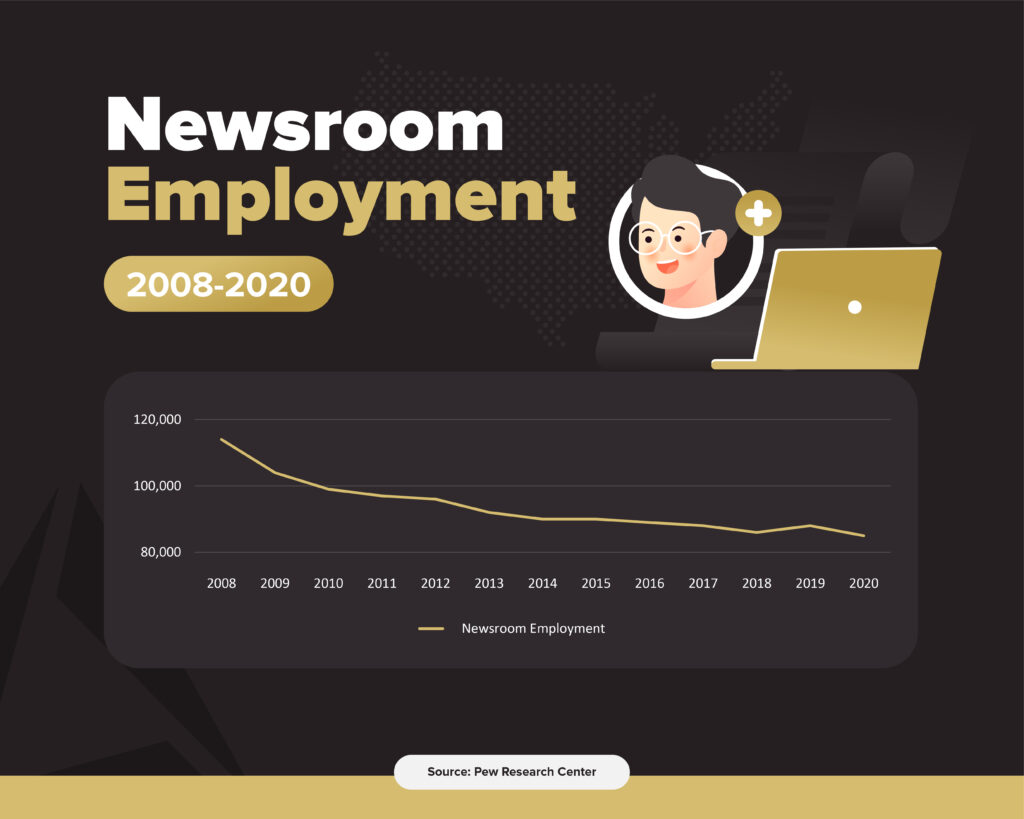
When creating our state ranking we focused on three main categories — journalist safety, local journalism job trends and salaries adjusted for cost of living. We hope that the 11 key metrics we compared in these categories can give journalists a comprehensive view of the pros and cons of working in each state.
Key Findings
- Kansas No. 1 Best State: Kansas has high salaries when adjusted for cost of living, a growing news media industry and is one of the safest states in the U.S. for journalists.
- California No. 1 Worst State: While median journalist pay is relatively high in California, it has not kept pace with cost of living. At the same time, California has the highest rate of assaults on journalists by members of the public, and one of the highest rates of press freedom violations.
- Safest States: The overall safest states for journalists since 1992 were Wyoming, South Dakota and Connecticut.
- Best Pay: New York, D.C. and Nevada were top three for the highest median journalist salaries in 2022. However, when salaries were adjusted for cost of living, Nevada, New York and Florida came out on top.
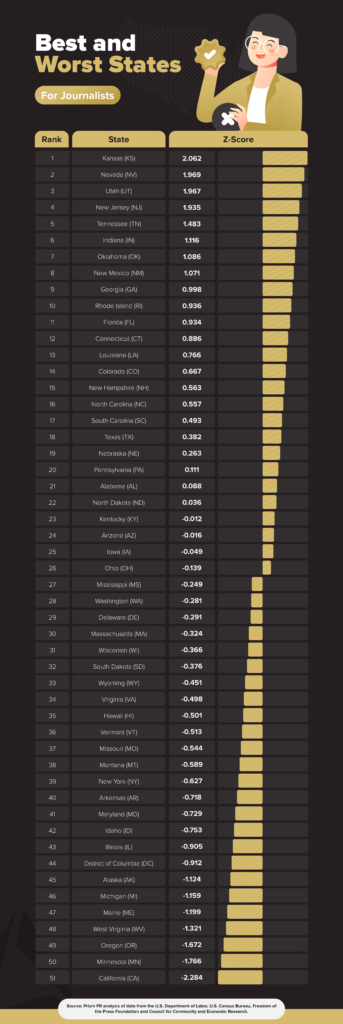
Best States For Journalists
Because states were ranked based on 11 different factors, our top states either have good grades all around or stand out in key categories.
1st Place — Kansas
Kansas, our No. 1 state, is an all-rounder. While median journalist salaries aren’t the highest in the country, things change when you consider cost of living. Once adjusted, Kansas places in the 90th percentile for compensation. It’s also the fourth cheapest state to buy a house, with prices 30% cheaper than the national average.
While local journalism industries have shrunk in much of the U.S., Kansas is staying ahead. The state’s location quotient — the number of journalist jobs per capita compared to the country as a whole — has increased by 60% between 2019 and 2022.
Kansas is also relatively safe with only one reported assault on a journalist since 1992.
2nd Place — Nevada
Nevada stands out in journalist compensation. It has the third-highest median wages in the U.S., and the highest wages overall when adjusted for cost of living. According to data from the Bureau of Labor Statistics, the top 10% of news analysts, reporters and journalists in Nevada are some of the highest paid in the country, with a 90th percentile salary of $206,420. Journalist jobs in the state are also projected to increase by 10.3% between 2020 and 2030.
3rd Place — Utah
Utah gets high grades in most categories. It’s relatively safe and has above-average journalist salaries combined with an average cost of living. The median journalist salary in Utah is $62,000, with the top 10% of journalists earning at least $135,150. Jobs projections are also strong, with the news industry expected to grow 5.5% by 2024, and 17.6% by 2030.
Most Dangerous States for Journalists
The Freedom of the Press Foundation and the Committee to Protect Journalists track all press freedom violations in the U.S. and provide a searchable database that can be used to evaluate states and cities. For our analysis, we’ve split incidents into four categories: assaults by law enforcement, assaults by members of the public, fatal attacks and other incidents such as legal harassment, threats, detainments and destruction of property.
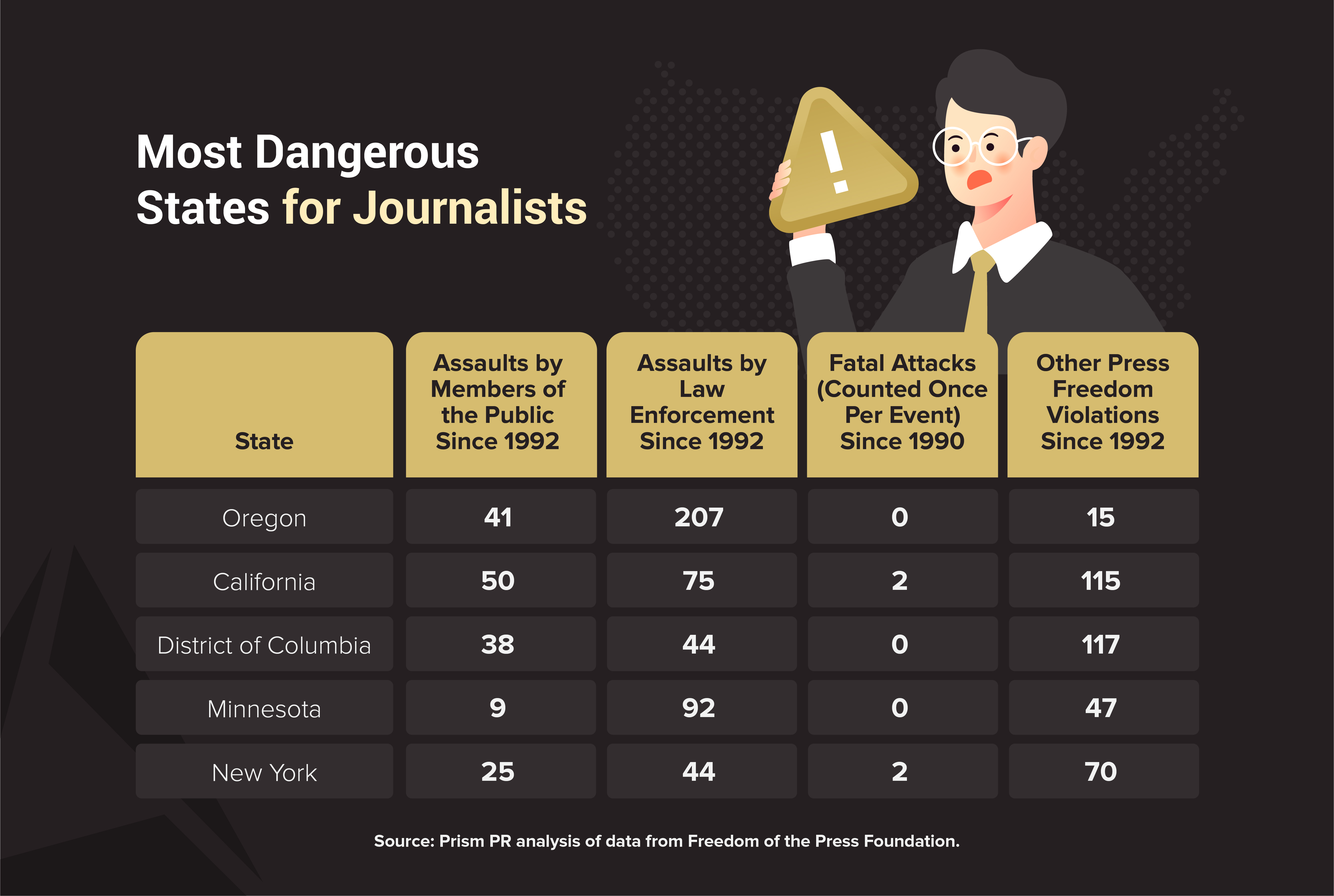
While the press freedom tracker lists all incidents since 1992, most of the assaults by law enforcement in states like California and Oregon occurred during protests between 2018 and 2023. If prolonged protests occur in other states in the future, they may experience similar declines in journalist safety.
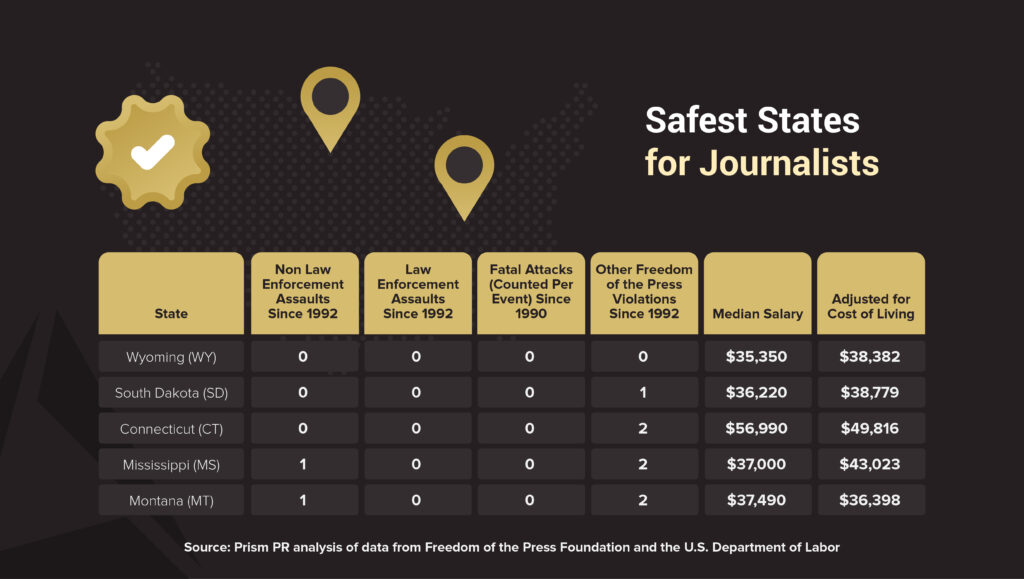
Unfortunately for journalists, the safest states in the U.S are usually also those where the median annual salary is below the national median of $55,960. The only state in the top ten safest U.S. states to surpass the national median is Rhode Island, with a median pay of $59,970.
States With Highest Journalist Salaries
Between 2019 and 2022 the median annual salary for journalists in the U.S. rose 20.9 percent, from $46,270 to $55,960. When you take inflation into account, journalist salaries still kept ahead, growing by 6%.
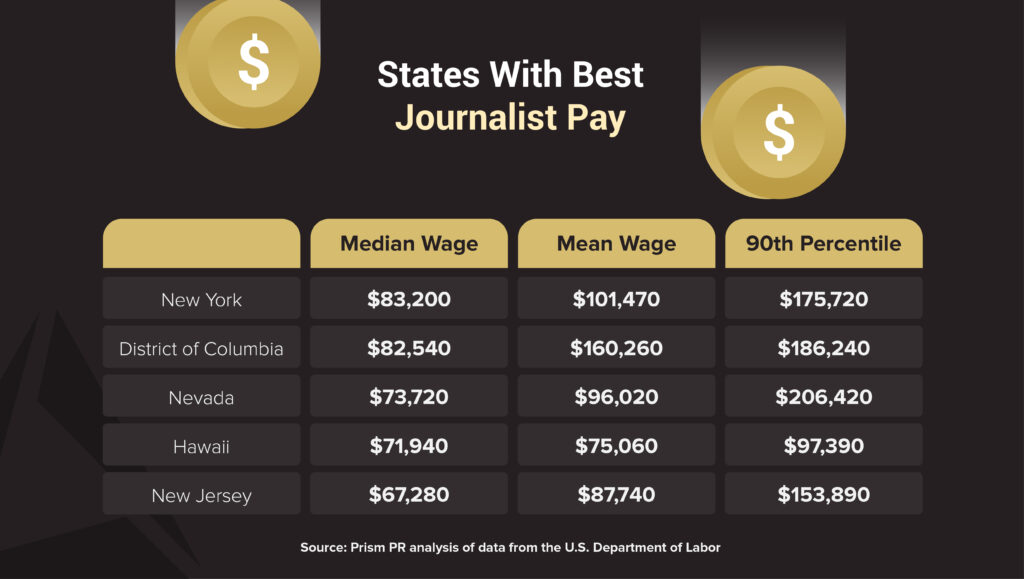
New York and D.C. have the highest median salaries in the country, but the top 10% of journalists make the most in Nevada. However, comparing salaries from different locations head to head can show an incomplete picture.
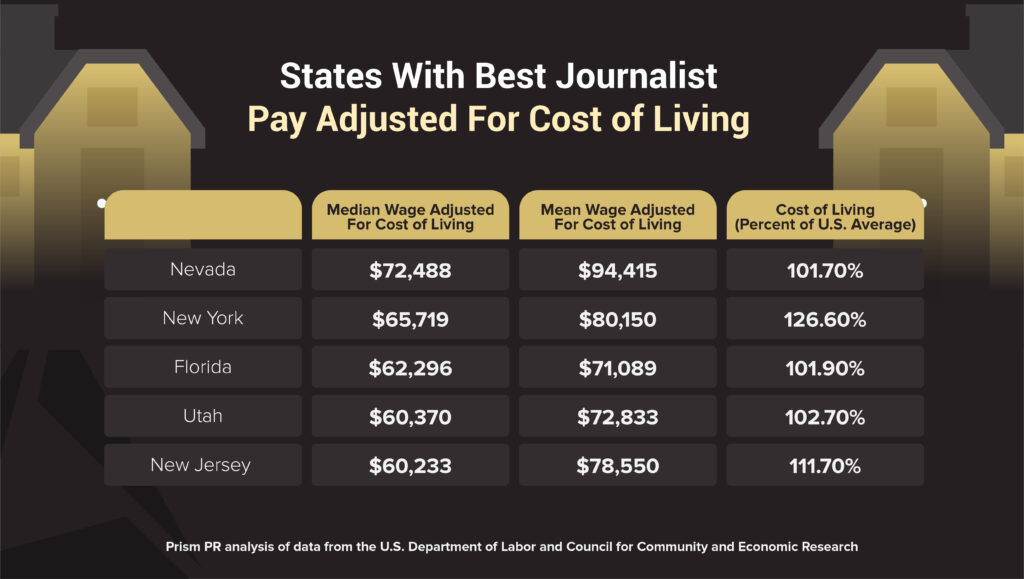
Once you adjust income for cost of living, expensive regions like Hawaii and D.C. get bumped by states like Florida and Utah, where salaries are still relatively high and prices remain close to the national average. Every person will be affected differently by cost of living, so journalists looking to move to another state should consider their specific situation before making a decision.
While states with good income-to-cost-of-living ratios might be better for those earning close to the median, expensive states with high 90th-percentile incomes like New York and D.C. might be better for senior journalists earning higher salaries. Past a certain threshold, those higher salaries will allow them to set aside more money for retirement, despite the higher cost of living.
States With Growing Journalism Industries
Between 2019 and 2022, national employment for news analysts, reporters and journalists grew by 0.98%. According to projections from the Bureau of Labor Statistics, journalist jobs are expected to shrink by 3.2% by 2032. However, on the state level, the numbers can vary significantly.
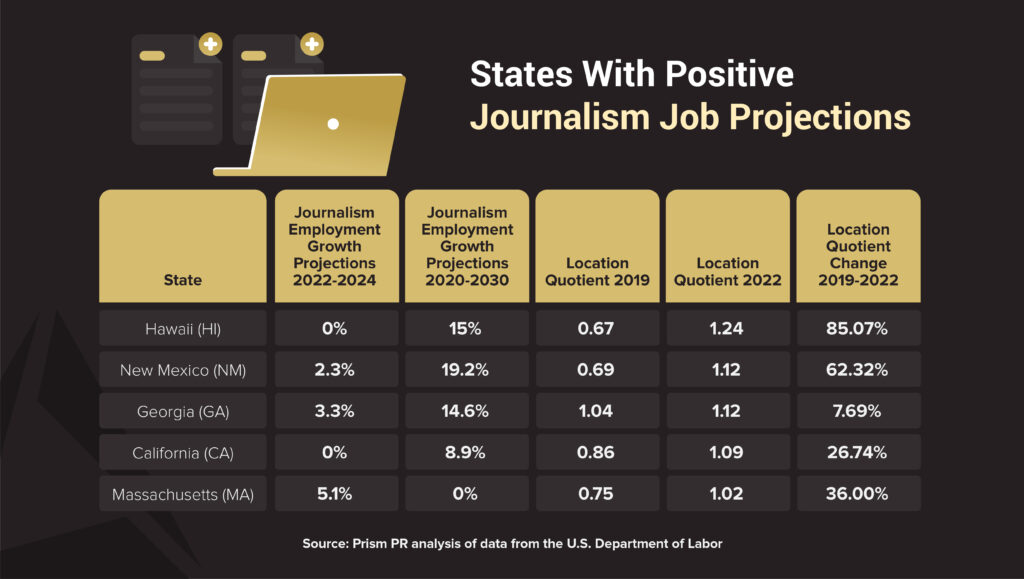
Hawaii, New Mexico, California and Massachusetts had a location quotient of less than one in 2019, meaning they had lower journalism employment per capita than the national average. Then, between 2019 and 2022, they all experienced rapid job growth, outpacing the country as a whole. Hawaii and New Mexico in particular are notable — even though their journalism job numbers have already grown, they are projected to grow even more before 2030.
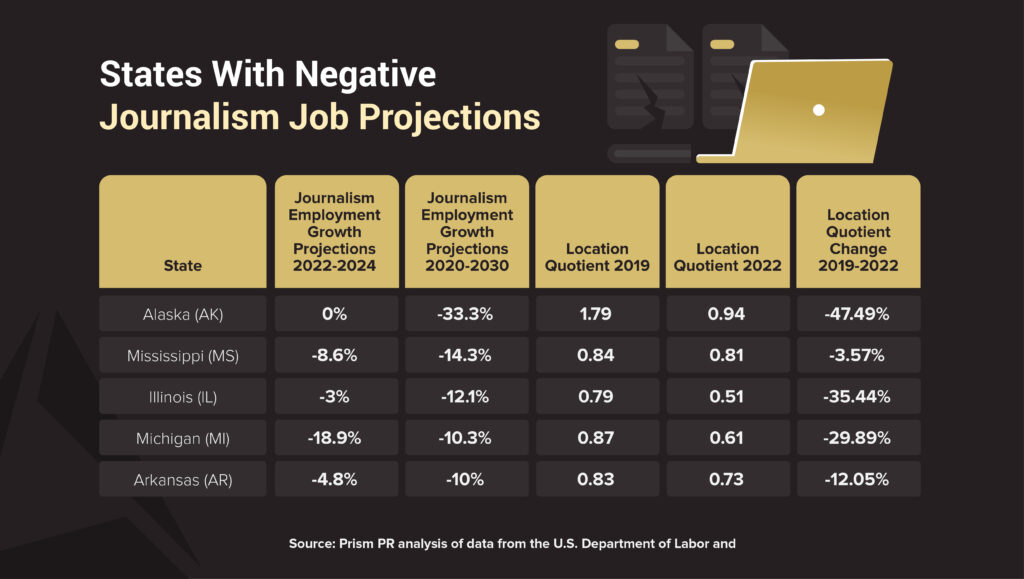
Alaska, Mississippi, Illinois, Michigan and Arkansas have already fallen behind, and government projections show that things are likely to get worse. This trend is most pronounced in Alaska, where journalist employment is projected to shrink over 30% more by 2030.
What Journalists Should Consider Before Moving States
In addition to the metrics listed in this report, there can be a variety of factors that can be subjective or hard to measure but can affect your quality of life in another state. Here are some things to consider when deciding whether to move:
- Types of work available:If you like what you do now, ensure that the state you’re considering has similar opportunities or new opportunities you’d like to take advantage of. For example, if your current specialization is corporate finance or in-person interviews with business leaders you may have fewer opportunities outside of large commerce hubs.
- Relocation Packages: If you have a job offer in another state, do they offer relocation assistance? In some cases, a company may offer to reimburse moving costs up to a certain amount, such as hiring a moving company. If not, consider the cost of moving in your decision.
- Weather: If you’re used to the sun all year round, you might not be happy in a place with cold and windy winters.
- Food, Culture and Hobbies: What you do outside of work can have just as large of an effect on your quality of life as your job. Does the state you’re considering give you the opportunity to do the things that make you happy? Perhaps it has unique food and culture that you’d like to experience, or interesting places to visit.
Conclusion
While journalist safety and job prospects are trending downward nationally, some states are less affected than others. Kansas, Nevada and Utah emerge as the most favorable states for journalists right now, with high salary-to-cost-of-living ratios, job prospects and safety. Conversely, California, Minnesota and Oregon rank as the most precarious, with increasing threats to journalists and salaries that lag behind rising prices.
Journalists weighing career moves or entry points into the industry can use these state-by-state metrics to aid in decision-making. With misinformation and economic volatility on the rise, it’s more important than ever for journalists to be able to operate in environments that are both safe and economically sustainable.
Methodology
To create our journalism state ranking we compared data for 11 key factors that affect journalists both at work and at home. These datasets were standardized through Z-score distributions and all outliers were capped at 2. The data was then combined through a weighted average function.
Here are our 11 parameters and the weights assigned to them in our formula:
- 9% — Non-law enforcement assaults on journalists 1992-2023 (U.S. Press Freedom Tracker 1992-2023)
- 9% — Law enforcement assaults on journalists 1992-2023 (U.S. Press Freedom Tracker 1992-2023)
- 6% — Fatal attacks on journalists (Committee to Protect Journalists)
- 8% — Freedom of the press violations (legal harassment, threats, detainments) 1992-2023 (U.S. Press Freedom Tracker 1992-2023)
- 6% —Journalism job growth projections for 2022-2024 (Projections Central)
- 4% —Journalism job growth projections for 2020-2030 (Projections Central)
- 8% — Location quotient (journalism job concentration compared to the national average)
percent change 2019-2022 (Bureau of Labor Statistic Tables 27-3023) - 30% — Median journalist salary adjusted for cost of living (Bureau of Labor Statistic Tables 27-3023, Missouri Economic Research and Information Center, Intuit TurboTax)
- 6% — Difference between median and 90th percentile income (Bureau of Labor Statistic Tables 27-3023)
- 9% — Housing cost index (Missouri Economic Research and Information Center)
- 5% — Average commute time (U.S. Census Bureau Comparative Economic Characteristics)
